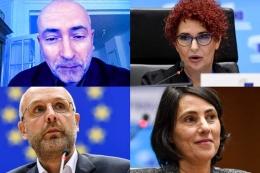European Economic
and Social Committee
The European Economic and Social Committee (EESC) is joining the EU's efforts to reverse the worrying trend of declining media freedoms and the increasing curbs on journalistic independence caused by mounting pressure from various power and business structures, poor pay, media ownership concentration and a proliferation of fake news on social media and other channels.
In a debate with the head of the Brussels Office of Reporters without Borders, Julie Majerczak, and the General Secretary of the European Federation of Journalists, Ricardo Gutiérrez, held during its September plenary session, the EESC expressed concern at the way journalists are increasingly becoming targets of verbal and physical attacks, with 16 murdered since 2015.
"We see trends in Europe that we cannot accept. Media freedom and diversity are the preconditions for a well-functioning democracy and therefore concern all of us. Professional journalism can never be replaced by algorithms, news aggregation and social networks," EESC president Christa Schweng said.
The EESC endorsed the latest European Commission initiatives, including the Recommendation on the Safety of Journalists, presented last week by Commissioner Věra Jourová. It welcomed the Commission president's State of the Union speech, in which Ursula von der Leyen announced the plans for the European Media Freedom Act.
However, in the opinion on Securing media freedom and diversity in Europe, adopted at the plenary session, the EESC called on the Commission to apply general conditionality rules and impose budgetary sanctions without delay on those countries where media freedom and pluralism were seriously threatened.
The rapporteur for the opinion, Christian Moos, warned: "Recommendations on the protection and safety of journalists will not be enough. There is no more time to lose. Member States that stifle media freedom must be excluded from Next Generation EU. The regulation on conditionality must be applied. Hungary and Poland are actively destroying or have already destroyed media freedom. Their governments must restore democracy and the rule of law, otherwise they cannot remain members of the EU, which legally guarantees democracy and the rule of law and, as an indispensable prerequisite for both, media freedom."
Ms Majerczak and Mr Gutiérrez expressed their support for the EESC opinion and for EU action to secure media freedom and pluralism, but stressed the importance of ensuring that the Commission's recommendations and proposed plan did not remain a dead letter. (ll)
